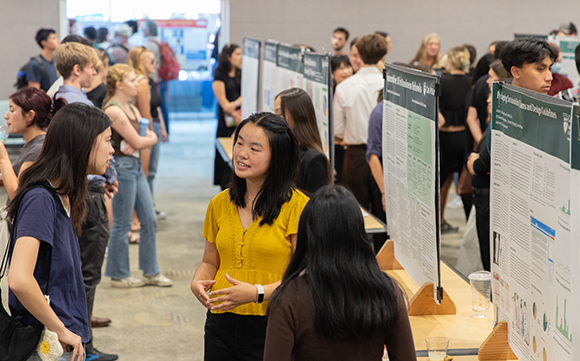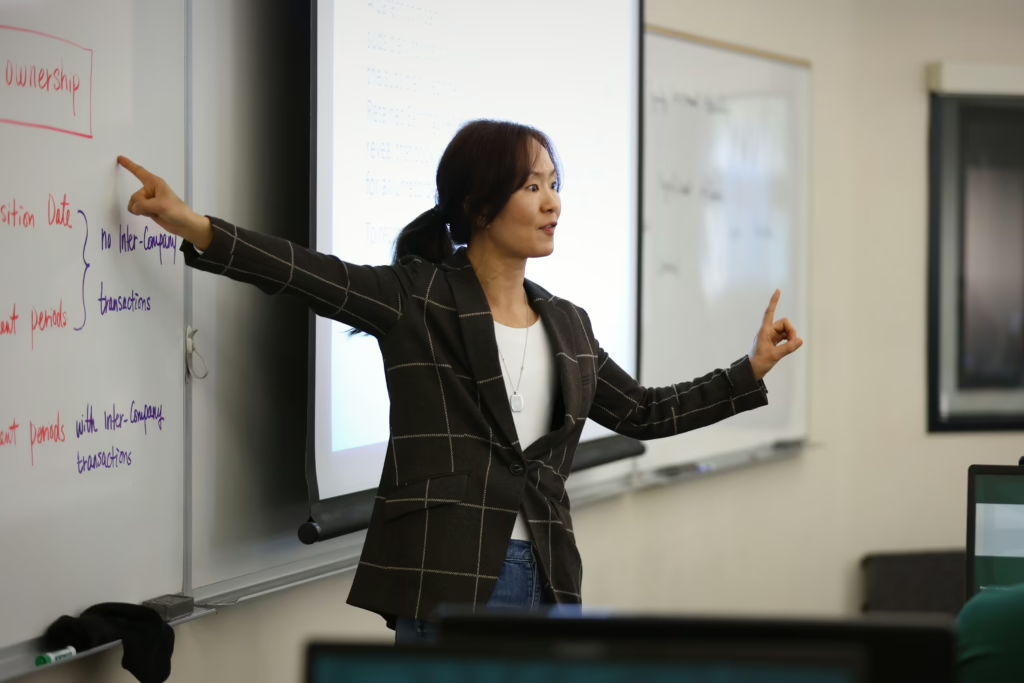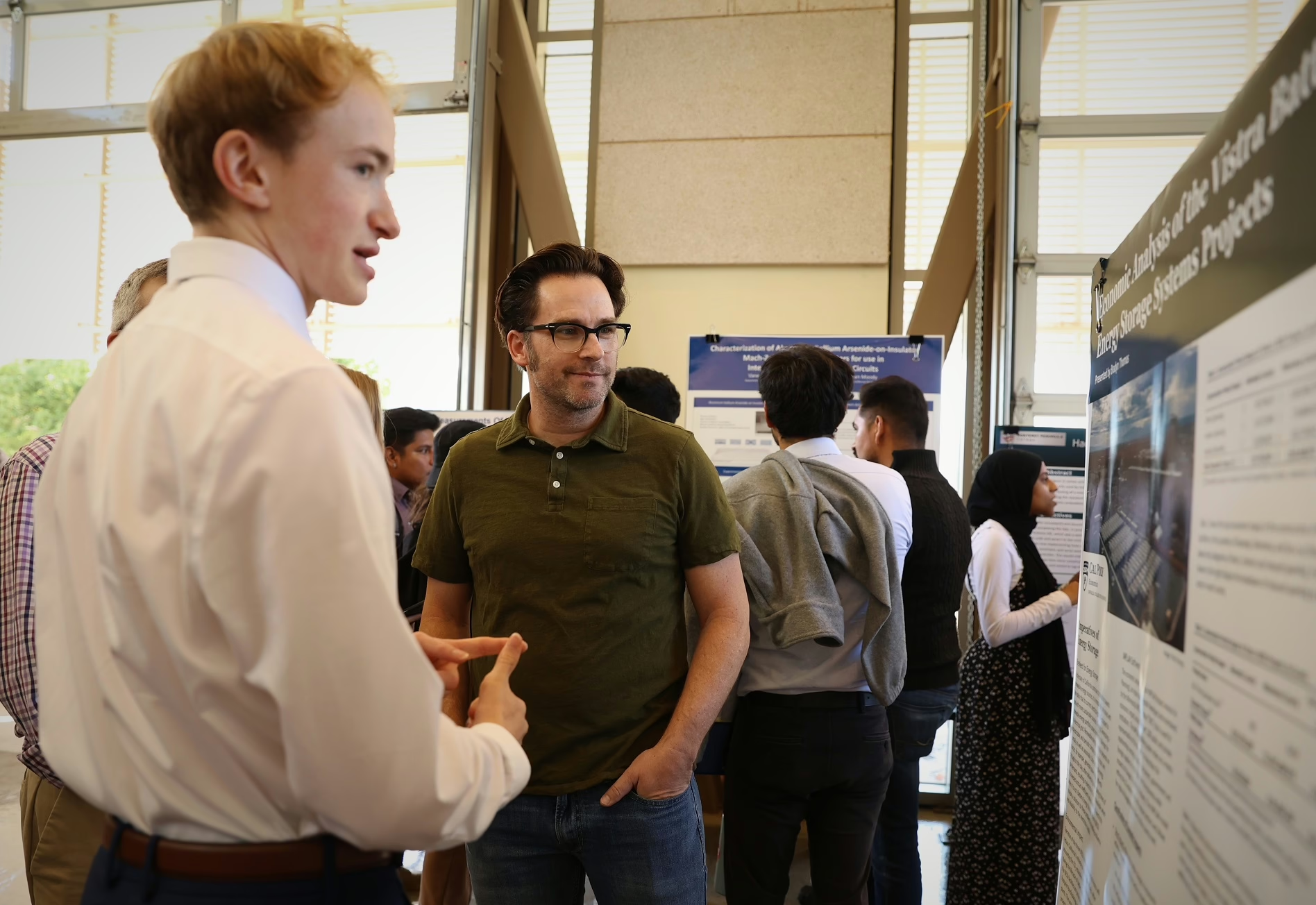Digging into the Research: Summer Undergraduate Research Program Pairs 37 Students with 20 Faculty Members

Students discuss their Summer Undergraduate Research Projects during the SURP+ Symposium in 2023. (Photo: Jahan Ramezani)
For this year’s Summer Undergraduate Research Project, accounting professor Li Dang and two student researchers are exploring how AI tools can mitigate “greenwashing,” or exaggerated claims, made by companies about their commitment to the environment.
“We’re glad we teamed up to pursue something we all care deeply about, research that not only sharpens our skills but also creates value for the community and society at large,” Dang said

Accounting Professor Li Dang is one of several faculty members from the Orfalea College of Business participating in this year’s Summer Undergraduate Research Program. (Photo: Pat Pemberton)
This project, titled “ChatGPT’s ESG Detective: Hunting Down Hidden Greenwash,” is one of 20 projects involved in this summer’s OCOB Summer Undergraduate Research Program (SURP), where students in the Orfalea College of Business work on research projects with faculty members. At the end of the program, students will present their research at the SURP+ Symposium in early October.
Marking the fourth summer that the business college has participated in SURP, 37 students and 20 faculty members are involved this year.
One project examines how the banking sector is able to withstand the current tariffs, with professor Cyrus Ramezani working with students Lena Nezamzadeh and Gustave Stork. Another project analyzes Court-Appointed Special Advocates (CASA), people who assist children in court proceedings, by looking at problems and solutions with the system and proposing techniques to incentivize student involvement in the CASA program. The professor on this project is Jack Wroldsen, and the students are Moraia Wroldsen and Thomas Sargsyan.
The program has grown over the years within OCOB, and this year over 60 students expressed interest in being involved. Information sessions were held for the different projects available and students were told to reach out to the faculty member leading the project they were interested in.
Faculty members made the final decisions on the selection for this year’s cohort.
Students who participate in the program receive scholarships as well as the opportunity to work with their professors in a Learn by Doing environment, according to Associate Dean for Programs and Learning Bruce Greenbaum.
“The direct research experience on actual academic research projects is extremely valuable – especially for students considering graduate school and or a career in academia,” Greenbaum said.
Sophomore Jeffrey Wu is researching shareholder proposals and how they affect banks with business student Hunter McGuire under Finance Professor Mahdi Rastad. Wu spends around 10-15 hours a week on the project now but said that it varies week by week and sees it picking up in the later weeks.

Economics Professor Jon James, center, listens to a student presentation during a SURP + Symposium in 2022. (Photo: Pat Pemberton)
Wu is looking for patterns in these shareholder proposals and how they affect the risk-taking behaviors by banks and their stability. Overall, the project aims to study the effectiveness of shareholder activism by looking at factors such as liquidity risk, credit risk and interest rate risk.
In pursuit of this research, Wu is making graphs, cleaning data and merging databases on Excel.
“The biggest takeaway for me is Excel because prior to coming to Cal Poly, I never really touched Excel at all and by being in SURP and merging databases and working with the data, I am able to learn a lot more about Excel and get creative with it, learning all these formulas and tricks.”
Wu said Excel is a fundamental tool in finance.
Associate Professor Bradford Anderson said this program is rewarding as a faculty member because the students bring alternative perspectives, views and questions to the project. Anderson is working on a project about approval requirements supervisors have set for employers to get vacation time. Anderson and his team are exploring whether employers use vacation approval requirements to conceal unlawful workplace discrimination.
“Sometimes you can go to an employer well in advance requesting approval and they might deny the vacation, and it seems rather random and arbitrary and discretionary as to who gets vacation time granted,” Anderson said. “There seems to be absolutely no foundation and no protection for employees against this arbitrary, capricious, discretionary grant or lack of a grant of the use of vacation time.”
One of the first things Anderson does is provide his students with a law journal article that he has written to give them a flavor for what the end goal of research is, Anderson said. He then gives them the resources to conduct their own research and then through discussions about their findings and what intrigues them, they build the research project along the way.
“The purpose of SURP is not for students to publish or write academic journal articles but instead to learn how to conduct research and provide a synopsis and overview of that research and to document that research,” Anderson said.
Tina Zeng, a senior, is exploring the impact of generative AI on business analytics and how to use it in the curriculum to enrich learning and skill development. Zeng said the project has pushed her to be an effective communicator as they work around their project members being on different schedules and living in different places. She said being able to manage their time and know their tasks has been crucial.
“The purpose of SURP is not for students to publish or write academic journal articles but instead to learn how to conduct research and provide a synopsis and overview of that research and to document that research.”
Bradford Anderson, associate professor of accounting and law
“It’s given me a better understanding of how to prioritize and stay accountable,” said Zeng, who is working with fellow business student Tanya Bakshi and Professor Leida Chen. “Not everything we’re doing directly ties into what we’ve learned in class, which means a lot of it has been about learning through doing and figuring things out as we go. That hands-on experience has made me more confident in getting a jump on things that in situations I haven’t encountered before.”
Accounting professor Li Dang’s favorite part of SURP is working with students as equal contributors outside of class.
“Through this research project, I’ve had the chance to foster a more collaborative dynamic, one where I encourage students to take the lead, share ideas freely, be bold and creative, and truly become the driving force behind our work,” Dang said.
Dang said this experience reflects the teacher-scholar model and is a wonderful example of how teaching, research and mentorship can come together. She believes that meaningful mentorship begins with empathy and early on guided them on reflecting on their learning goals, the purpose of the research and what implications it might have.
“Research requires structure and discipline, and I help them stay grounded and on track without stifling their enthusiasm. I see SURP as an incredible opportunity for students to grow not just academically, but personally and professionally as well,” Dang said.
Your support for the Dean’s Fund for Excellence supports programs like SURP and others that provide students skills beyond the classroom.
